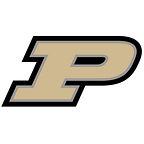Meet Purdue’s Virgin Galactic Astronaut
A Q&A with Beth Moses, a Boilermaker alumna leading the way on commercial spaceflight — and fresh off her own suborbital mission
Space tourism may sound like a concept that only exists in the pages of a Ray Bradbury novel, but it’s much closer to a reality than you might think. Purdue alumna Beth Moses is the Chief Astronaut Instructor and Cabin Test Lead at Virgin Galactic, a commercial spaceflight company that’s preparing to send space tourists to the final frontier beginning later this year. In fact, Beth just returned from a Virgin Galactic flight last month as its first cabin evaluator. She earned her bachelor’s and master’s from the School of Aeronautics and Astronautics at Purdue. After Purdue, she worked at NASA as the Extravehicular System Manager for the International Space Station.
We talked to Beth about Virgin Galactic, space flight and her time at Purdue.
Tell us about your role(s) at Virgin Galactic.
Virgin Galactic is currently testing SpaceShipTwo’s customer cabin prior to starting commercial service. It’s my role to establish and lead our cabin test program to ensure that the ship’s systems are safe, effective, enjoyable and live up to the Virgin standard for commercial service. In order to do that, I establish the test objectives, write the test plans and train the test subjects to conduct ground and flight tests in various environments and facilities. This process includes mock-ups, simulators, parabolic aircraft, and our beloved spacecraft, VSS Unity. It also dovetails perfectly into my symbiotic and original role as the Chief Astronaut Instructor at Virgin Galactic. In that role, I led the development of our commercial astronaut training program and am refining it through our test program. Once we enter into commercial service, I will use that to train Virgin Galactic astronauts for their spaceflight.
What was your recent flight as Virgin Galactic’s first “test passenger” like? What did you encounter that expected about the experience? What was unexpected?
It was an honor and it went like clockwork! I had a timeline of objectives to accomplish and worked through my procedures methodically — but I’d be lying if I said I didn’t enjoy it immensely. Most of the experience was very much as expected because I had been researching our cabin experience very thoroughly using test flights with sensors and mannequins. There are two truths that stood out though: Parts of the flight were more pleasantly intense than I could have predicted, and Earth was shockingly beautiful from space. I flew on a clear, bright day and I could see glistening white snow covering our planet’s mountains from all the way up there. Earth was wearing her diamonds that morning!
How do you prepare people for space flight?
Very enthusiastically! Our commercial astronaut training program unfolds over roughly three days at our spaceport in New Mexico. The first day revolves around you, and acclimating to the forces on your body, your suit and your gear. The second day extends into the cabin with your crew mates, and the third day prepares you for mission readiness, including a dress rehearsal and final fit checks. This is also roughly the order I use to train individuals to conduct cabin testing during our flight test program. Those individuals are serving as professional astronauts with a tightly scripted and complex job to perform within a high-performing and tightly constrained mission team. The preparation for that is longer and highly tailored to their specific flight duties and the broader flight objectives.
What do you envision the future of space tourism to look like?
Boundless and fascinating!
How did your time at Purdue prepare you to be a leader in the aerospace industry?
My time at Purdue was priceless and one of the bedrocks of my toolbox. Purdue not only provided me a very solid engineering education — complete with the requisite all-nighters and infuriating homework — but also vested me with the ability to think independently, broadly and deeply. I’ve frequently heard it said that Purdue “teaches you how to think,” and it’s quite true! Perhaps, more importantly, Purdue nurtured my childlike joy of aerospace into a professional outlook while, with my blessing but not always to my delight, beating into me the engineering chops to serve the greater good effectively. I couldn’t thank Purdue more!
